#footage used from various documentaries
Explore tagged Tumblr posts
Text



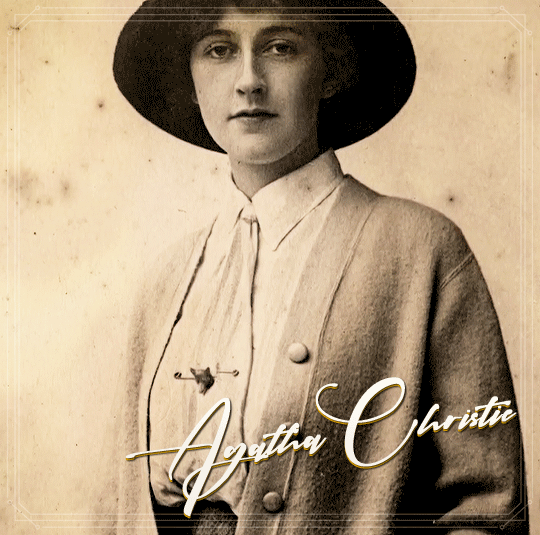



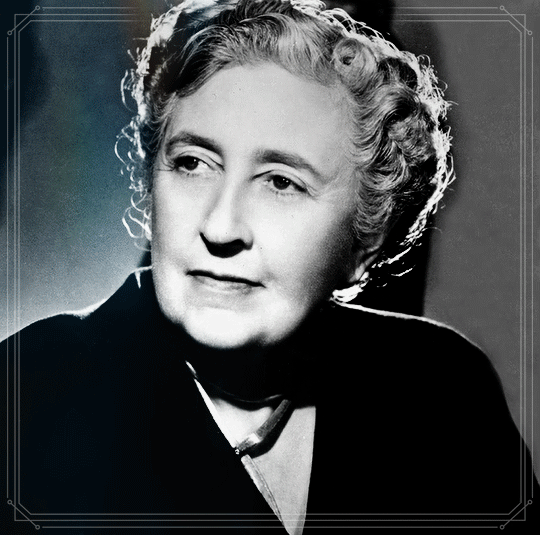
HAPPY BIRTHDAY, AGATHA CHRISTIE! (b. September 15 1890)
Dame Agatha Mary Clarissa Christie, Lady Mallowan, DBE (née Miller; 15 September 1890 – 12 January 1976) was an English writer known for her 66 detective novels and 14 short story collections, particularly those revolving around fictional detectives Hercule Poirot and Miss Marple. She also wrote the world's longest-running play, the murder mystery The Mousetrap, which has been performed in the West End of London since 1952. A writer during the "Golden Age of Detective Fiction", Christie has been called the "Queen of Crime"—a moniker which is now trademarked by her estate—or the "Queen of Mystery". She also wrote six novels under the pseudonym Mary Westmacott. Guinness World Records lists Christie as the best-selling fiction writer of all time, her novels having sold more than two billion copies.
#agatha christie#poirot#hercule poirot#books#booklr#detective fiction#tvedit#perioddramaedit#doyouevenfilm#dailyflickrs#violaobanion#*edit#LOVE YOU AGGIE <3<3#tagging this with tv and film since agatha is#the source of many detective shows <3#footage used from various documentaries#like lucy worsley's the queen of mystery :)#i've added some atmospheric effects to the gifs#to make them livelier
217 notes
·
View notes
Text
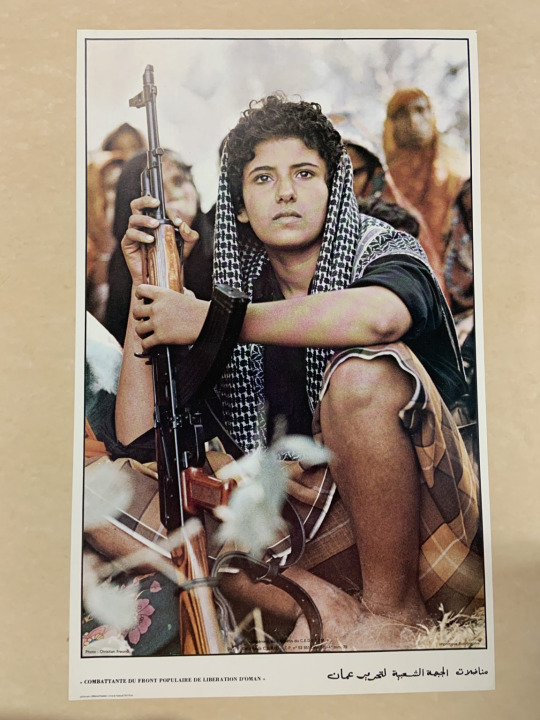
A poster of a female cadre photographed by Christian Freund. Source: Center for the Study of Political Graphics (CSPG).
Women’s Liberation
A striking aspect of the popular revolutionary movement in Dhufar was the PFLOAG’s commitment to the liberation of women, a policy that was adopted at the 1968 Hamrin Conference. The PFLOAG believed that the liberation of women was central to the success of the revolution which would not come about automatically but through a sustained struggle against the “objective backwardness” of society. 1 The Dhufar Revolution was influenced by Maoist thought, including on the equality of female cadres, popularised through Mao’s famous declaration that “women can hold up half the sky”. 2 Women’s political participation in the armed struggle alongside men was deemed an important aspect of equality while specific policies were later implemented in the liberated areas to transform the social position of women, such as the banning of female circumcision, polygyny, and the reduction of the bride price after unsuccessful attempts to abolish it completely.
The PFLOAG’s policies remarkably challenged the “unhappy marriage” between feminism and Marxism, as conceptualised by the Western feminist scholar Heidi Hartmann in 1979 – in other words, the tension between women’s liberation and national liberation. 3 The PFLOAG recognised the double oppression faced by women, both in terms of their position as women in relation to men, and in terms of their position as women in relation to the economic system. Attracted to the PFLOAG’s radical position, the Lebanese filmmaker Heiny Srour travelled to Dhufar in 1971, capturing documentary footage of women fighters later used in her 1974 film The Hour of Liberation Has Arrived (Saat El Tahrir Dakkat). 4
I was a defeated feminist in Lebanon. The Lebanese Left was not interested in feminist issues and kept closing the subject under various pretexts, one being that the women will be free when the main enemy, Imperialism, is defeated. […] I couldn’t believe my ears when the representative of the Popular Front for the Liberation of the Occupied Arabian Gulf opened the subject of women from his own initiative and proudly said that the Front was fighting against women’s oppression — because women were not just oppressed by imperialism and class society, but also by their father, husband, brothers. I dropped my other film projects and put all my energy into making this film. 5”
— Heiny Srour on The Hour of Liberation Has Arrived
The campaigns for, and implementation of, the above mentioned policies came through the initiatives of revolutionary women, the Bahraini cadre Laila Fakhro (Huda Salem) for example pushed the PFLOAG to ban female circumcision and limit the bride price. 6 Laila Fakhro also played an important role in the revolution through political education, teaching, care-work, women’s activities, and the PFLOAG’s media and foreign relations. 7 The PFLOAG’s other main periodical, 9 Yunyu (9 June), was a monthly magazine which preceded Sawt al-Thawra’s founding, set up in June 1970 by Laila Fakhro and Abdel Rahman al-Nuaimi (Said Seif). 8
Sawt al-Thawra promoted women’s political participation in armed struggle, drawing parallels to female fighters such as Vietnamese women and thereby placing the PFLOAG’s revolutionary women in the wider tradition of the revolutionary Third World. The periodical highlighted and documented women’s protest, arrests and mistreatment of women and girls by the British-backed regime, and women’s internationalist activities. Women’s representatives and delegations took part in many regional and international conferences, prior to and after the official establishment of the Omani Women’s Organisation in June 1975, a committee headed by Wafa Yasser.
The first official visit by an Omani women’s delegation, comprising Nadia Khaled and Huda Muhad, took place in July 1975 in a symposium on women’s economic development organised by the Soviet Women’s Committee in Alma-Ata, Soviet Republic of Kazakhstan. Following this trip to the Soviet Union, the delegation visited the Democratic Republic of Vietnam at the invitation of the Women’s Federation of Vietnam. 9 These encounters were important for producing strong ties of solidarity, the exchange of experiences and ideas, and direct engagement with a major source of their own inspiration, the Vietnamese people’s struggle. Most significantly, these material links demonstrate that Dhufar was not a detached revolution in a little-known and distant part of the Gulf, but one that was globally connected and which importantly placed emphasis on women’s political participation.

#marxism-feminism#oman#Popular Front for the Liberation of the Occupied Arabian Gulf#revolutionary feminism#revolutionary women#women guerillas#Dhofar Rebellion
99 notes
·
View notes
Text
I saw Jungkook's documentary this weekend and have just a few thoughts. If you're avoiding spoilers, don't click the cut!

The Hybe Documentary Format

So...as a reminder to you all, I do not have professional expertise in the film industry. I'm just a very discerning consumer. I also haven't seen Hobi's documentary and I watched Road to D-Day while I was quite ill last year so I only vaguely remember some bits. (I'll definitely be getting back to those sooner rather than later though as research for a series of posts I'm developing.) That being said, I think we have enough data points to state that Hybe has absolutely no interest in filmmaking techniques outside of music videos.
I did mostly enjoy my experience seeing this film yesterday and I'm always grateful for any amount of footage the members are willing to share with us but this 'documentary ' was worse than Jimin's Production Diary. Any of you that managed to make it through my rambling review will know how dissatisfied I was with that.
I Am Still is not a documentary, it's a mixture of showcase footage and behind-the-scenes clips, most of which has already been divulged in the various episodes and shooting sketches on YouTube. Honestly, if you're not able to see the film, just go rewatch all of the bangtantv content for JKs solo period and the showcase and you'll be up to speed with 85% of what was in the documentary.
There are definitely some expansions to the storylines featured in the bangtantv content; mostly being anything that wasn't overtly optimistic. For example, we learn a little bit more about just how sick JK was during the Seven/3D promotions. That content likely was pulled from the bangtantv edit because it would have put a damper on the promotions and given certain 'fans' a focus to fixate their vitriol. But overall, it feels more like an extended version of existing content rather than a new work. At least JPD didn't continually feed us footage we'd seen before.
I'm someone who gets completely bothered by previews spoiling content so I didn't watch any of the promos until after I saw it and I am so glad I skipped them because most of the 'original' scenes of the film were featured in least one of them. Alas, that's a separate issue of which I'm definitely in the minority.
Was There No Structure?

Kinda. Like JPD, there is a semblance of a structure: Attempting to follow the chronology of release activities for JKs GOLDEN album through the lens of JKs staement trying to prove that he is still worthy of everything he was being hailed as during the BTS group activities but I don't feel this was successfully executed. It jumps round enough and isn't very successful in explaining the events if you didn't already know about them. The film starts with the SEVEN performance at GMA and footage that we've already seen of JK recording SEVEN, not mentioning anything about the music video or really how JK got involved with the song in the first place. The rest of the story beats have similar missing points.
They have a vague narrative with the 'I Am Still' points but that's mostly carried by subs and a couple of moments that JK mentions himself. I'm not saying it's not true or wasn't top-of-mind for JK during this process but it's not the main point of many of the moment/messages he shared with us during this time period so it feels a little disingenuous since everything else jn this film really only makes sense if you've already seen quite a lot of behind-the-scenes content.
Honestly, it makes me question the intended audience. Obviously, they know that ARMY will shell out whatever we need to when there's new content from our members but most of us will have already seen all of the bangtantv content so we are already familiar with the most of the footage in this film. I genuinely don't think this was produced in such a way to be palatable for audiences not familiar with BTS so who does that leave? Our friends and family that are peripherally aware of the content but haven't learned the basics of JKs album? ARMY with short term memories only?
But again, it seems this film was compiled by an editing team and not lead by a director with experience in crafting a documentary. The only new footage that Ican guarantee was captured with the express purpose of being included in this film was the few clips of JK talking in the practice room with the albums displayed by him. But we all know that's where all of the promo clips were gathered as well. I have issues with that approach as well but I'll leave this point alone for now unless anyone is interested.
Suffice it to say, all of these suppositions over the past year about how JKs documentary was getting special treatment or even questioning about investment in a project up front are dead. This was a product assembled with bits of what they already had completely in-house which was sold for distribution.
So, Did We Learn NOTHING?

No, there are a few Golden nuggets (see what I did there?). I can't recall everything having only seen it once (and having a rather disruptive audience - I swear there were only dozen or so ppl in my theater but I forget how obnoxious teenagers can be. I'm glad they're enjoying and supporting but we really didn't need light sticks flashing during a film and how many times does one person need to get up to answer their phone during this runtime? Three according to the row in front of mine.)
Anyway, something I thought was interesting to learn was that Standing Next To You was initially recorded the day after JK heard it for the first time. And hearing a little more about how JK yearned to perform that song definitelygot me thinking a little more about it. We can't reach any conclusions just with this little nugget but it does open the door to some theories. Like perhaps they were initially planning to have JK record two separate albums? SEVEN and 3D would be the singles of the first and JK would perform them as we saw but perhaps STNY was originally planned to be the single of the 2nd album that would release while he was in the military and thus be unable to perform it? Maybe JK loved STNY so much that everything was grouped into one album and Never Let Go was the only track held back for ms? Definitely some theorizing space to be had now.
Final thoughts?

Similar to my thoughts on the GCF: Budapest (which I feel would have had a much better reception if it had been labeled as a bangtan episode rather than a GCF), I AM Still should not have purported to be a documentary. It was much more similar to the annual Memories compilations. But the general public would not have shelled out the $25 to go to a theater to watch a Memories DVD so alas, we have our content packaged as a ~documentary~...
Did my view on the music change at all? Not because of the documentary. We're coming up on the year anniversary of GOLDEN and it's still definitely not my favorite. I completely understand why some people like it but it's just not to my taste. The overall impact falls a little flat for me. Too much breadth and not enough depth. I came into my musical soul during the 00s emo phase and will always be a sucker for music that absolutely drips in an emotional way rather than catchy songs vaguely referencing heartache and love. Again, just a matter of viewpoint.
I do think most of these songs stand much better being shuffled amongst other artists in a Playlist and several of them are significantly better when JK sang them live but I still won't be listening to them regularly. I wholeheartedly believe JK completed his task of proving himself as an extremely dedicated and versatile singer and performer. He's definitely got some solid points added to his resume after this project.

37 notes
·
View notes
Note
So growing up I only knew Johnny Chambers as the Quickstart infomercial guy. Come to find out he did a whole documentary series on mystery men after the war. Have you had a chance to see any of those films?
I had to basically watch Chambers' entire filmography in college

(A promotional image produced for Quickstarts internal biography of Chambers. It is often pointed out for this image that Chambers famously refused to make use of his powers during film making as he felt he lost control of the edit's smaller details doing them at super speed)
While like you said Chambers is more well known now for his foundation of the Quickstart lifestyle and wellness brand, now run by his daughter Jesse, he started his career and was mostly known throughout his life as a documentarian. In fact it was his connections, formed from the creation of international newsreels for Warner Bros' "March of Time" series that originally lead him to befriending the eccentric mathematician Dr Ezra Gill who would discover the ancient formula that formed the secret of Johnny's power set. During the war and even for some time after it he never quite got rid of the filming bug, surrounded by such interesting people as he was. Chambers himself was most often responsible for the footage of the Squadron and other teams that would appear in newsreels during the war. His first solo outing would be a 15 minute reel titles "Inside Squadron Home Base!" released in early 1942 which was a tour of the Perisphere complete with some quick introductions to Chambers' core teammates (including an interview with Johnny Quick himself to obfuscate the fact that Chambers was the one filming). He would complete another half dozen Squadron focused newsreels during the war itself: -"The JBA is on the Move!" (1942), that covered the JSA's official absorption into the All Star Squadron and their very short lived renaming to the Justice Battalion
-"Workforce Heroines!" (1942), Starring Wonder Woman, Ms America and Hawkgirl explaining and advocating for women in vital war industries.
-"Our Young All Stars!" (1943) Explaining the formation of the Young All Stars and introducing them to the public at large. Rather infamously this reel was censored without Chambers' knowledge to cut out the interview of the team's Japanese American member Tsunami and even cropping her out of many background shots. -"Above Enemy Lines!" (1943), which focused on the work of the Blackhawks and Freedom Fighters to infiltrate and undermine Axis activity on active front lines.
-"The Mystery Man March!" (1944) Explaining, somewhat, the development of the American Mystery Man, drawing a broad philosophical line from the country's revolutionary heroes a la Tomahawk, through western heroes like Bat Lash and Pow Wow Smith to the modern Mystery Man. The historiography here is RIDDLED with holes but it was the first attempt to do something like what I do and so many details we know now were unknown -"American Mettle!" (1944), A piece lionizing American industry and manufacturing through the mouthpieces of Commander Steel and Robotman. It is almost comical how much Steel does ALL of the talking during this reel. One can only imagine poor, surly Robotman needed to be dragged to the set via forklift. This, of course, being on top of producing his actual workload of regular Newsreels through Warner Bros. Chambers made a vague attempt to enter the nascent television industry post war in various behind the camera capacities for the sake of supporting his then young daughter. It wasn't until much more recent times when he founded Quickstart where he became well known as a motivational speaker, former superhero, etc, etc, etc.
#dc#dcu#dc comics#dc universe#superhero#comics#tw unreality#unreality#unreality blog#ask game#ask blog#asks open#please interact#worldbuilding#johnny quick#johnny chambers#jesse quick#jesse chambers
21 notes
·
View notes
Text
Mockumentaries
The mockumentary format can be really fun, but I've been thinking more and more about how it's not always used to its best effect. Binge watching Abbott Elementary is what has really brought some of the specifics of this into focus, and it's what is freshest in my mind at the moment, but it isn't limited to one show. My problems with it manifest in many ways, and there's nuance to all of them, but to boil them down to their essentials it's usually:
Characters doing/admitting things they want to keep secret, either from the world or from other characters, while aware they are being filmed
Shows going on for years and years, which indicates either that the documentary crew are sitting on years' worth of footage or that the fictional documentary is being released year by year equivalent to how we see the real show
Characters going off to have private moments and acting as if there isn't a cameraman (or several for all those extra angles) two feet away from them.
On the first point, especially egregious examples include the breaking of laws or rules. My main example, because it's the episode I'm halfway through right now and the thing that compelled me to make this post right now, is everyone at Abbott trying to hide the fact that they got the computers as bribes from the golf course. Even if they deceive this one guy (I'm five minutes from the end), it's going to get out eventually via this documentary they're all so happily admitting it to. This goes for various things throughout the show, including more than one plot-important blackmailing.
Even when it isn't something illegal, there are plenty of things that characters are trying to keep secret from other characters, and yet they're brazenly doing or talking about it on camera. Relating this to the second bullet point, it is thus weird when characters find out information in later seasons from interactions with one another, when they should have found that out from watching the prior season (if we assume that is how the documentary functions).
I thought about these first two bullet points a lot during the latter seasons of What We Do in the Shadows, particularly whenever the characters would emphasise that vampires are meant to be secret (eg. when Nandor appeared on the news and they freaked out, or when Nadja yelled at Nandor for sponsoring a marathon during the Vampiric council stuff). They did at least fix all this in the final episode, with the vampires explaining that they've had many documentaries made about them and none of them have ever aired, which is the sort of absurdity that fits really well in the wwdits universe. Even so, this was a last minute addition and my experience of the show as a whole was (very slightly) marred by this dissonance.
On the third bullet point, this is possibly the most egregious because it often takes me out of the most emotional scenes. This especially goes for characters sneaking off to be alone. Sometimes we only see these moments from a distance, as the camera crew has to sneak an angle to catch the character unawares, which works a lot better. Sometimes, though, this goes out the window. Because I watched it yesterday, my mind goes to Janine leaving her School District party to be alone in her office, where there are two different close up angles from inside this very small room. It's not inconceivable that she'd still be able to experience this big moment without acknowledging that she's being filmed from very close up, but it doesn't feel entirely realistic, and there are plenty of similar moments throughout Abbott Elementary and other shows.
There are lots of other little things that can break the immersion - such as the (multiple) cameras already being in the flower classroom when Janine and Gregory have their first kiss, given that J&G think the place is locked and no one is meant to be there. So, the camera crew just ran ahead, got inside and waited, then Janine and Gregory break in and don't even acknowledge the fact that these people who've been filming them for however long are already in there? - but it would be impossible to name them all individually.
It works best for me when the cameras are acknowledged as part of the world. You want to make it so that these characters know they're being filmed? Use that! For example, when Janine and Gregory actually get together and have their second kiss, Gregory dismisses and shuts them out! It still felt weird to me that they started kissing when the cameras were right there, but I love that they chose to acknowledge that it would be forced and unnatural for these two characters to finally get together while a camera crew stared at and filmed them at close quarters.
Anyway, this isn't supposed to be a rant against any particular show's use of the mockumentary format (apologies to Abbott for being my main source of examples). It's more an observation of the way it's used (or misused) in general. If I could be bothered, I'd watch a bunch of shows and take notes every time something bothers me, but it's not that big of a deal. I can see why showrunners choose the mockumentary format, as it allows characters to express their thoughts directly to camera. This can be very valuable, especially since theatrical soliloqoys feel out of place in most standard TV shows. However, while I can suspend my disbelief to an extent, it does often take me out of the world and I'd love to see more care taken when figuring out how the fact that these characters are being filmed would affect the way they act.
#abbott elementary#what we do in the shadows#I worry this sounds like I'm slamming abbott when I'm really not#I actually love the show and I'm so nearly done with it! I'll probably make another post talking about it in a couple of hours!#but this has been percolating in my mind for a long time#and now I've been immersed in the format for several days and I keep thinking about it so I just wanted to get my thoughts down#wwdits is the last mockumentary I watched and I remember a couple of examples from that#(some of which I did mention on tumblr as they happened)#but I remember far less of what happens in others I've watched like the (british) office or 2012 or W1A#those are all british shows interestingly and I have a vague recollection that they aren't as egregious in their misuse of the format#and are also often more naturalistic in their tone#but it's been years so maybe I'm biased and remembering through rose tinted glasses#perhaps I will rewatch one of those at some point and pay attention to their use of the format#and maybe I'll watch the american office one of these days for comparison#I do seem to remember that a lot of the will they/won't they stuff with dawn and martin freeman#in the office was done in a much more understated filmed-from-a-distance way#abbott elementary mine#wwdits mins#wwdits#mine
12 notes
·
View notes
Text
I wonder if we will come to look back on that supposed great virtue of our age – controlling the narrative – and see it for the cornered form of submission it so often is? I felt nothing but immense pity for the cancer-stricken Princess of Wales before the release of her intimate family video yesterday, and the sheer weirdness of the resulting enterprise has only magnified the pathos of her situation. Watching the three-minute film, shot by some ad man, I wondered who could possibly feel it was anything but sad that a recovering post-chemo mother should feel that this is her best option for keeping “well-wishers” at bay a little longer.
A lot of people could, it seems from the feverish coverage since it dropped – meaning that convention demands I couch the notion that the existence of the video is in any way weird as “my unpopular opinion”. In which case, allow me to chuck in another unpopular opinion: this sort of thing appeals precisely to the grownups who when Diana died demanded that the then Queen leave off comforting her grieving 12- and 15-year-old grandsons in Scotland to come back to London – in effect to look after them instead. The selfishness and self-importance of a certain stripe of loyal subject is at best demandingly prurient and at worst grotesque. We hear a lot about the male gaze. The royalist’s gaze could do with more unpicking.
Hilary Mantel understood this voraciousness where royalty was concerned – recognised it even in herself. Royal Bodies, her epic 2013 essay for the London Review of Books, began with a passage on Kate – itself disingenuously and enthusiastically misconstrued by the tabloids. Later on in the piece, the Wolf Hall author described coming up close to the late Queen at a palace reception. Mantel confessed: “I am ashamed now to say it but I passed my eyes over her as a cannibal views his dinner, my gaze sharp enough to pick the meat off her bones.”
And so to Kate’s video, shot by a man who has also shot campaigns for Uber Eats, and who made Tesco’s Food Love Stories commercials. Something else is being served up here, which for some reason he has decided to make look like a Center Parcs ad. Despite artfully included clips of Prince George asking of a camera “Is this filming?”, the video was not captured by a GoPro on a picnic rug, but by a crew and a significant post-production operation, who made studied use of filters and slow motion, switching from sweeping shots to grainy scenes designed to ape cine film. Unlike the private home movies in the opening titles of Succession, the footage shows a happy family – but for my money, the sense of menace is still there. But whereas the Roys are menaced from within, the menace to the Waleses comes from the outside – and it is the endless and thankless task of appeasing it that dictates that this video must exist at all.
Various media have added to the threats that always beset the throne, and, with its scenes of picnics and secluded country days, this video explicitly echoes Queen Elizabeth II’s famous decision to allow the cameras into her private family life in 1969 for the famous/infamous Royal Family documentary. That was an attempt by the crown and its courtiers to meet the medium of television on its own terms. Decades later, opinion is still divided as to whether it was a PR masterstroke or the moment the rot set in. “It was difficult,” concluded the historian Ben Pimlott in his biography of the late Queen, “once the genie of this kind of publicity had been let out of the bottle, to put it back in again.”
Fifty-five years on, the Princess of Wales’s video feels like an attempt to meet social media on its own terms. Social media is, of course, the arena in which hunting Kate became a jolly global blood sport earlier this year, when – despite having been explicitly told that she would not appear in public before Easter owing to significant illness – the #BeKind brigade grew bored within weeks and whipped up a vicious feeding frenzy of conspiracy theories as to her absence and the reasons for it. Despite condemning the ghouls of social media, sections of the traditional media merely put quote marks round their vileness, running coded versions of precisely the same hounding. Kate tried silencing it with a Mother’s Day photo; minor editing glitches immediately became a “scandal”, for which she absurdly felt obliged to formally apologise. Next, multiple royal experts and headline writers explained that the true problem was that the palace had “lost control of the narrative”. Eventually, a video in which a poised yet fragile Kate revealed her cancer diagnosis was judged the only way to regain it.
Inevitably, meanwhile, the same critics who detest Harry and Meghan’s barefoot California content decline to look at the style of the Waleses’ video and consider that the Meghanisation of the royal family continues apace. Things that are bad when the Beckhams do them are axiomatically good when royals do them, selling the crown being an activity from which the news media arguably profit most of all. This accounts for much of their magnanimity towards Kate’s latest video.
But service is not the same as people feeling forced to serve themselves up. It was often said, back in the mid-90s, that Diana learned to control the narrative. Did she really, though? As David Beckham stagily remarked in infinitely lighter circumstances in a recent candid film of his own: “Be honest.”
14 notes
·
View notes
Text
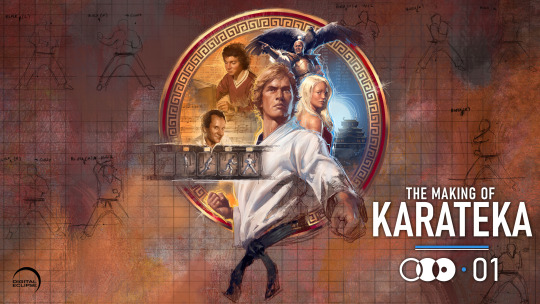
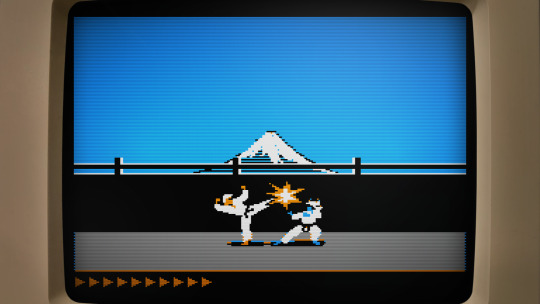
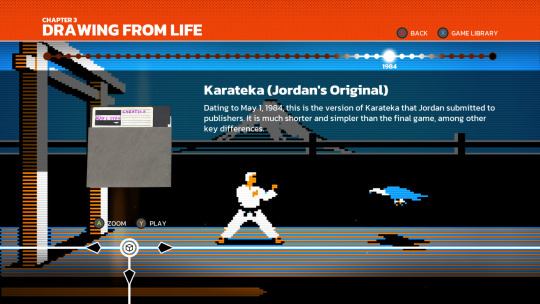


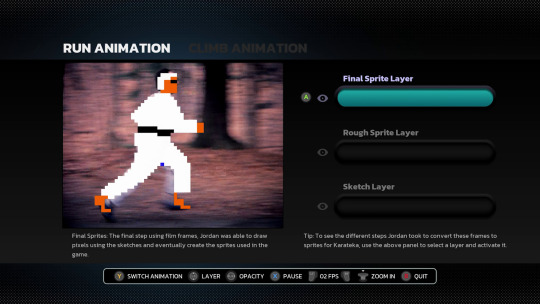
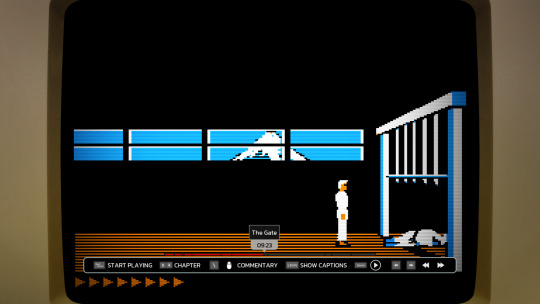
I never played Karateka in the 80s, but as a big fan of Prince of Persia and Jordan Mechner's journals, I was stoked to hear that an interactive documentary about Jordan's prototypical cinematic platformer was in the works by Digital Eclipse.
Released this week, The Making of Karateka on the surface looks like any other game you buy through Steam ($20, Windows-only), GOG, or whichever favorite store or console you prefer (available also for Xbox, PS4/5, Switch). Once the thing loads though, you really get 3 things: a documentary, the original Karateka, and a new remaster.
The documentary part is an audio-visual slideshow retelling Jordan's development story starting with his teenage years pitching his earlier title Deathbounce to the publishing house Brøderbund. It's an interesting look into the iterative process, seen through correspondence letters, journal entries, and many playable builds at various stages of completion. After we reach the eventual rejection of that title, Jordan comes back with a prototype of a visual-narrative experience unseen on home computers. We get to follow Karateka's full life cycle from pre- to post-production, ending with the conception of its sequel (which eventually turned into Prince of Persia). It's a real treasure trove! Fellow pixel artists will appreciate the many graph-paper sketches and interactive overlays of final game sprites compared to rotoscoped outlines and filmed footage. There are also video segments, from a comprehensive breakdown of the music to interviews with other developers reflecting on the impact Jordan's games had on their careers. You'll even encounter a fan letter signed by the one and only "John Romero, Disciple of the Great Jordan and worshipper of the Magnificent Mechner!" (I kid you not, you can't make this stuff up).
Perhaps just as crucial for an interactive documentary like this, you can launch any of the floppy disks in the emulator, trying out various iterations and ports of Karateka.
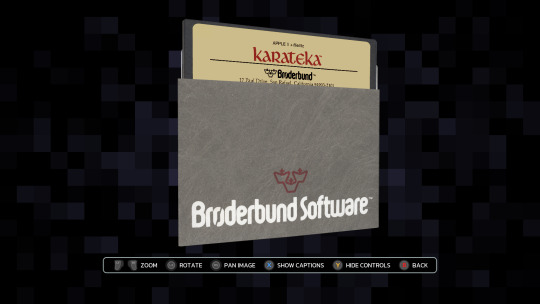
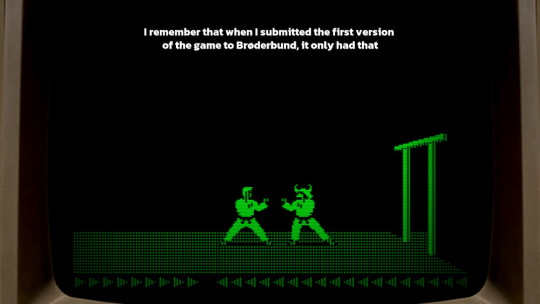
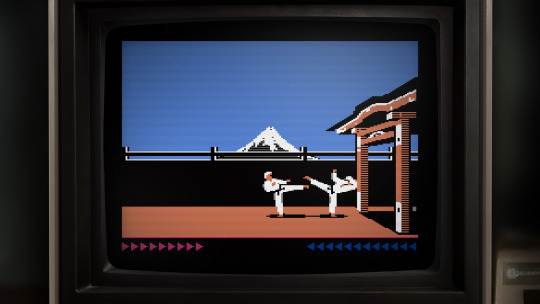
The emulation is fantastic and lets you fiddle with display settings (monochrome or color display, scanlines, pixel perfect or zoomed) as well as enhance the frame rate. You can even rewind the many deaths you will face if you've never played the game before (like me). If you spend some more time obsessing over the weird artifacts of the Apple II hi-res graphics, you might even go down the rabbit hole of realizing that on the Apple II you didn't really paint colors as much as you used different monochrome dithering patterns that the graphics display would then turn into 4 different hues. A fascinating learning experience if you include some of your own research online!
youtube
Add to this the Commodore 64 and the Atari 8-bit versions to compare how the graphics got adapted across the earlier ports and you have a nice way to relieve the mid-80s with a bit of help from modern emulation (I did beat the C64 version without rewinding though!). I'd love to see more art from the other remakes, especially the 16-bit Atari ST port, but I understand their decision to omit playable versions of those due to the lower quality on the gameplay side of the translations.
This brings us to the final part of the package, the modern remaster. Unlike the 2012 complete reimagining of the game (with 3D graphics and all), Digital Eclipse approached the remake as the ultimate port of the original to an imaginary system along the lines of a 90s VGA PC.

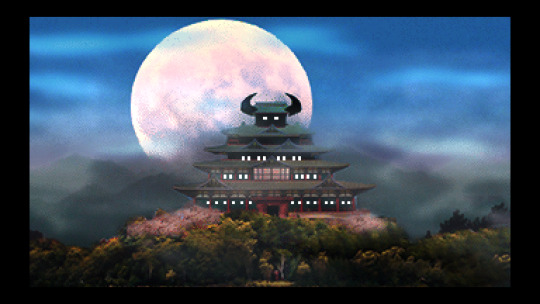
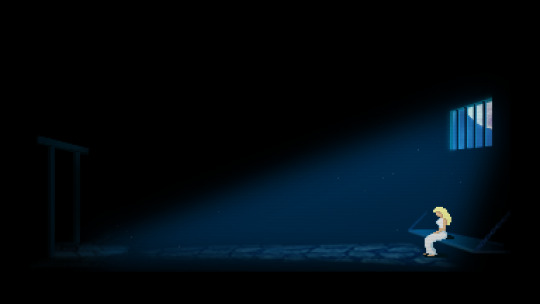
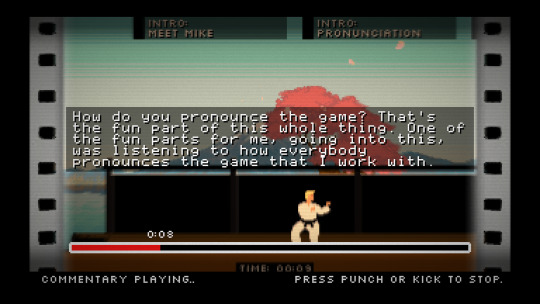
It's well done. Some of the fully-redrawn scenes are a bit overpainted for my taste (I'd prefer a pixel art rendition of the castle than a blurry photographic collage, although there were many games in the 90s that did take this approach), but the in-game graphics are really in style, including the smooth animations that are like one would imagine granted a beefier CPU. It's also a sort of director's cut with previously unseen scenes added, in particular, the battle with the leopard as a clever action-puzzle in the middle. The AI is unfortunately even less challenging than Jordan's implementation. As great as the 6-move fighting system could have been, you yet again resort to simply kicking away opponents as they tirelessly crawl into your range. There isn't even the nuance from the original where you were the one who had to approach some enemies with skilled timing. On the other hand, you now have optional goals and achievements that make the repetitive/easy combat work in your favor (stringing various combos, beating opponents or the level under a time limit …). As the Digital Eclipse president Mike Mika admits at the end of the welcome commentary mode, they didn't manage to achieve their perfect port, but they did come close.
In conclusion, I thoroughly enjoyed playing both the original as well as the remake and while the combat system lacks any sort of depth beneath its stunning animations, Karateka is instead a monumental experience for its presentation. Big characters with personality and realistic motion are displayed through cinematic camera cuts and story vignettes (3 years before Ron Gilbert came up with the word "cutscene"). There are details like animating the unfortunate falling off the cliff at the start of the game, or respectfully bowing to the first guard as they bow in return. Jordan's creative work is precious and worth the attention this release gifts it.
I highly recommend The Making of Karateka to all retro gamers and/or game developers for its immersive documentation which provides an experience that goes beyond the usual video documentaries. It's interactive—just like the subject it's talking about—something I want to see more in the future. And if the $20 by any chance seems high to you, consider that the original retailed at $35 (and that was in 1984 dollars).
youtube
77 notes
·
View notes
Text
yesterday was national aviation day so here's "valley of the dolls" my marina and the diamonds using documentary footage of the F-117 nighthawk (from an old VHS tape my dad made using various documentaries and airshow footage.
totally was meant for yesterday. totally wasnt made to test some video editing. totally didn't take several hours, one corrupted video file and a frozen computer to finish.
11 notes
·
View notes
Text
miscellaneous things i think could be good (or just funny) in a modern freakazoid reboot
dexter has a small friend group he plays dnd and other games with (because help him, this boy needs some legitimate friends)
more of dexter and freakazoid interacting with each other, being able to see how their internal communication works. bonus if freak can just. pop up on dexter's computer or phone to chat with him
a new villain or plot device based on generative ai, messing with freakazoid's sense of what's true and false (possibly deadpan? the early villain in the s1 finale?)
an episode on just how exactly to do a freakazoid reboot. freak himself is in the studio trying to find the best pitch to turn into a show, and even in the writing room, telling people that no, actually, he'd never say that, have you even SEEN the original show --
a whole episode's running joke of being sponsored by an mmorpg (with 20% off if the viewer uses the code RPGFREAK20XX). freak goes after the game's creators near the episode's end when he gets sick of the interruptions
valerie returns with a bit of a larger role, being steph's friend and possibly becoming the previously cut-from-production witch girl (because we need more women in this show)
short joke of freakazoid stopping a fight to tell someone who's playing a video loudly without headphones to stop it, it is DRIVING him UP the WALL. GEEZ
fanboy makes a return, and introduces his little sister: a freakazoid fan who's a little too into him and her favorite fandom ships. freak wants nothing to do with her, her brother, and her "intense interest with cargo and freighters"
cobra queen has an online shop where she makes snake-themed jewelry and does makeup tutorials. freakazoid is happy to support small businesses. he is not happy when she still uses her massive pet serpents to break into stores to steal things
gutierrez, with the internet taking off, also deals in developing software at apex. the new social media app they make leeches info from others to sell, but its main use is to find, tag, and track freakazoid wherever he goes
one of the villain's plans involve those fridges that come with a touchscreen and built-in wifi. imagine their surprise when freak is able to zap inside. he's on one of the shelves eating food and asking for condiments
an episode where lobe's scheme is based on one of those viral, seemingly silly mobile games everyone plays (flappy bird, candy crush, cookie clicker, etc). even the show's staff are taken with it. the narrator interrupts the program at one point to mention that he will no longer be announcing things because he's too busy playing the game himself
freakazoid learns about vr being a thing, and becomes a cryptid by popping into random games and streams. there's a whole short done like a found footage film or documentary based on people's attempt to find him
freak does a parody of youtuber apology videos for a segment, saying sorry to the viewer. by the end, it's clear he's badly reading off a script, and admits he doesn't even know what he's apologizing for
cave guy's plan for an episode being intimidating various scholars, professors, and newspapers to hide articles and research behind a paywall (which goes directly to him, of course). freak learns about it because dexter needs to write a paper for class, and needs to race against the clock to get his sources unlocked before its due
a short based on dexter trying his hand at streaming games. he ends up temporarily famous for his really well-done "custom freakazoid vtuber model" (it's just freak himself)
a short based on longhorn trying to get into nashville by becoming a music influencer. he does not get far
you-know-who has happily settled into his role as an internet creepypasta. there's an episode where freakazoid needs to follow a string of disappearances, linked with a recent internet "challenge" and posts trailing off after saying candlejack, which is harder than it s --
#freakazoid#freakazoid series#freakazoid!#cocoapost#ever since i finished watching the show i have had. ideas#i'd love to see a modern reboot with how the internet is nowadays#is it likely? maybe not#but i can DREAM DARN IT ALL#anyways if y'all have thoughts i would love to hear them
15 notes
·
View notes
Note
Hello! I am just starting my journey on reconnecting with my traditional roots as an Italian practitioner. My great grandparents came from Italy in the mid 1900s, but unfortunately passed before I had the pleasure of asking about their practices. Can I ask a good starting point for someone who is trying to reconnect all on her own?
Hello!
I am so happy that you are wanting to reconnect with your roots! I'm sorry you didn't get the opportunity to ask your grandparents, my deepest condolences for your loss.
In terms of resources, my recommendation for anyone starting out is to go to folklore sources or to read books by authors who don't simply reference other witchcraft authors. I highly recommend reading Italian Folk Magic: Rue's Kitchen Witchery by Mary-Grace Fahrun. It's mostly her personal experience with Italian folk-Catholicism and magic with plenty of anecdotes, recipes, superstitions, and various rituals. I think it's probably the best widely available source out there. She also has a youtube channel! In a similar vein, the website Italian Folk Magic has some great posts about Southern Italian and Sicilian magic.
Other online resources I've found useful are Gail Faith Edwards' writings on Southern Italian healers and folk medicine (it's split into 2 parts–– there's a lot of great information if you're into herbalism/ green witchcraft). I also love this article detailing witchcraft history, superstition, and more throughout Italy. It goes into a lot of detail and has some information about herbal properties and their uses as well.
Here are some festivals and traditions from across Italy tied to folk belief: Focara of Novoli, The Campanacci in Basilicata, The Feast of San Domenico and the Ritual of Serpari of Cocullo, Naca Procession in Southern Italy, Dance of the Devils, Celebration of Santa Lucia, The Feast of Mamma Schiavona––There are many others (mostly Saint feasts) that have pre-Christian roots or have significant rituals attached.
Most information that I have collected comes from anthropological and folklore sources that aren't very accessible. There are some videos available of documentary footage of Italian anthropologist Ernesto de Martino's work detailing folk tradition: here's a clip of La Taranta. This documentary isn't in English, however you can still get a lot out of it even if you don't speak Italian (unfortunately there are no subtitles). The documentarian that worked with de Martino, Luigi Di Gianni gives some of his recollections here. Here is a clip documenting the Feast of Mamma Schiavona. Otherwise, everything else is behind a paywall on sites like jstor, sagepub, and other academic publishers. I would recommend reading anything by anthropologist and folklorist Sabina Magliocco (I have copies of her work), as well as de Martino's Magic: A Theory from the South (which I also have a pdf of). The academic texts can be a little dense and daunting, but they're worth the read.
I have uploaded some of what I have to WeTransfer, but it will only be up for 1 week (until July 10th) so if anyone else would like to download them, you can for a limited time!
#italian folk magic#folk magic#folk traditions#witchcraft#beginner witch#baby witch#witchblr#italian witchcraft#grimoire#book of shadows#streghe#stregoneria#benedicaria#witch tips#long post#witches of tumblr
123 notes
·
View notes
Text
Narrative Frameworks in Only Friends
Something I have been tracking as part of the ongoing discussions about Only Friends is the use of the narrative framework for each episode.
So, I’m making this list specifically for tracking purposes, to note which framework was used for which episodes, if they repeat, and what they may be paying homage to. The goal is to update it every week. Due to suggestions, I am also tracking the end credit scenes, as well as any specific visual or audio formats used in the episodes.
Frameworks so far:
1. Voiceovers: gives the audience specific insight into a characters thoughts and feelings; also a great way to provide exposition. It’s more of an audio than visual framework, as we don’t always see the character doing the voice-over because it plays over other scenes.
2. “Talking Heads” (is there a better descriptor for this?): The characters talk directly to the camera, interview/documentary style. We get to see exactly how they feel about a given moment because they are reacting to it at that time. Audio and visual. Homage to Love8009 (per P'Jojo).
3. Social Media (ft The Artist Formerly Known as Twitter, Instagram, and Facebook): Not as insightful as the other two frameworks but does give context and a way for interaction, commentary, and exposition on a given plot. Visual. Probable homage to Together With Me, one of the first spicy BLs starring our kings, MaxTul.
(Side Note: I was re-watching some scenes from Never Let me Go and realized P'Jojo uses yellow text on the screen in it too. So maybe he just likes the yellow text or maybe it means something, idk, idk.)
Discussion: Ding, dong! Are the narrative frameworks dead? P'Jojo posted on The Artist Formerly Known as Twitter some pictures that implied the talking heads framework was coming back; they included Sand, Ray and Boston (I cannot find the link to Boston's, if someone has it please let me know and I'll update the post). Their clothing matches up with this episode. Very clearly the framework was not used. This is the second time that P'Jojo has actively chosen to remove a framework from an episode (that we know of) and I'm super curious if he will say anything about why he cut it.
Having said that, do we think this means the frameworks are dead?
I had been positing that the show started out as a BL with the various frameworks and that we left the BL genre for a bit, with the idea that frameworks would be coming back as we headed back into the BL genre. I still think that is what the show is kind of doing, however, I'm waffling on if the frameworks are permanently gone. One one hand - they were used brilliantly and it was fascinating to watch. On the other hand - we haven't had them for five episodes and bringing them back now might feel jarring? The show also stands just as well on it's own without them.
Do we need them back? Is it better with them gone? Will we get them back?
Discuss!!!
Episode 1
Framework: Voiceover
Title: What’s Your Role in a Bar?
Narrator: Mew
Visual Moment: Yellow title cards listing everyone’s “roles” as well as the month and days of the week
End Credit Shot: Mew sitting on the floor in front of his fish tank
Episode 2
Framework: Talking Heads
Title: M.F.M. My Favorite Man
Narrator: Everyone
Visual Moment: The talking heads scenes
End Credit Shot: Ray driving
Episode 3
Framework: Social Media (Twitter and Instagram)
Title: What Am I to You?
Narrator: Nick and Boston
Audible Moment: Nick listening to the TopBoston sex audio
End Credit Shot: Nick listening to TopBoston sex audio
Episode 4
Framework: Voiceover
Title: Emergency Contact
Narrator: Ray
Visual Moment: The flashback of RayMew is in 4:3 ratio; meaning it looks like recorded footage versus a memory, yellow text onscreen indicates flashback
End Credit Shot: Ray driving (repeat from episode 2)
Episode 5:
Framework: Voiceover
Title: The Extra Hour
Narrator: Sand
Visual Moment: Intro and Outro are animated; black and white (made me think of the Take on Me MV by A-ha but I’m open to suggestions on what this might be referring to)
End Credit Shot: Sand driving his motorcycle
Episode 6:
Framework: None
Title: Happy Fucking Birthday
Narrator: None
Audible Moment: Ray listens to the TopBoston sex audio; Mew plays the TopBoston sex audio for Top
Visual Moment: Top draws Mew sleeping/gives Mew a book of drawings he did of Mew
End Credit Shot: Top in his bathtub alone looking angsty
Episode 7:
Framework: None
Title: After Effect
Narrator: None
Visual Moment: Mew setting the drawing on fire; Boston’s sex tape; the “super zooms”
End Credit Shot: Mew sitting on the floor in front of his fish tank (repeat from episode 1)
Episode 8:
Framework: None
Title: Save Me
Narrator: None
Visual Moment: Facebook party invite/everyone’s reactions to the invite; Everyone’s costumes at the party
End Credit Shot: Boston looking angsty at the hostel
Episode 9:
Framework: None
Title: The Return
Narrator: None
Visual Moment: Boston’s photo of Atom; Top recording SandRay kissing, BOEING (I had to, lmao)
End Credit Shot: Top in his bathtub alone looking angsty (repeat from episode 6)
Episode 10:
Framework: None
Title: Redemption
Narrator: None
Visual Moment: The "I will never leave you"/"I will never love you" neon sign; Boston's photos of Atom; Nick's photo as Boston's lock screen (I'm fine!); Boeing's Instagram
End Credit Shot: Ray driving (repeat from episode 2 and episode 4)
If anyone can think of anything else to add, please let me know! If you would like to be tagged in this post or any other meta, let me know and I’ll add you.
Tagging the Ephemerality Squad: @lurkingshan, @waitmyturtles, @wen-kexing-apologist, @chickenstrangers, @ranchthoughts, @twig-tea, @clara-maybe-ontheroad, @distant-screaming, @thatgirl4815, @elizabethsebestianhedgehog
Tagging @sandrayy by request
Apologies to anyone I forgot!
37 notes
·
View notes
Text

Douglas Gordon
Film noir (Fly), 2008
Film Noir (Fly) is a black and white video projection showing a close-up of a fly lying on its back, intermittently twitching its legs but unable to get up. The artist Douglas Gordon fixed the fly’s wings to a table top and recorded its struggle until it died. The work thus presents the artist, and by implication the viewer, as sadistic. Gordon has featured flies in other works. For instance, the two videos Fuzzy Logic and B-Movie, both from 1995, which show single flies twitching their legs and wings until they die. For the artist these works represent ‘an image of something that we kill everyday. We see them dying in corners of rooms at home; we don’t care about them. Some of us even tortured these things as part of a “game” to play when we were children. But seeing something like this in a museum becomes a much more distressing game to play.’ (Quoted in National Gallery of Scotland 2006, p.114.)
In 1995 Douglas made a number of black and white videos under the title of Film Noir. In these works he displays an obsession for closely and zealously observed details which are enclosed in repetitive structures. The title of these works corresponds to a cinematic term used primarily to describe a genre of Hollywood crime dramas from the early 1940s to the late 1950s. The Hollywood film noir period is generally associated with a low-key, black-and-white visual style with roots in the cinematography of German expressionist film. Film noir reacted against the dominant ideology of society and the conventions of contemporary Hollywood films, introducing the noir hero who is defined by a dark personality qualities and who occupies a disturbing and dangerous world. By appropriating the cinematic term, Gordon’s Film Noir videos take on its associations, becoming the vehicle for his most recurrent themes, such as moral ambivalence, guilt and death.
Based in Glasgow and New York, Gordon works in various media including film, text, photographs, video and various types of installation. He has become best known for works made using existing film footage – both documentary and fictional – altering its pace, context or scale.
Via
6 notes
·
View notes
Text
SATAN WANTS YOU (2023)

“Michelle Remembers” was published in 1980, purportedly about the abduction and abuse of Michelle Smith as a child by…Satanists! Her psychiatrist, Larry Pazder, was co-author. This well-produced documentary follows the duo and their families as they cope with the book’s fallout and also traces the influence of the book upon popular culture, leading to…the Satanic Panic!
Anyway, Larry had previously counseled Michelle, and, after she suffers a miscarriage, she returns to his care after suffering a bad dream. Using some technique that is “beyond hypnosis,” she begins to recount horrifying childhood memories involving her mother handing her over to Satanists so they can…torture her? It’s not quite clear. With the help of a grant from the local Catholic church, Larry compiles the taped sessions into a book, which becomes a hit! The pair do a publicity tour, appearing on TV shoes, being interviewed, where breathless journalists ask Michelle about her experiences.

Michelle and Larry's marriages are ruined. Michelle calls him constantly and follows him around. Larry's wife, Marylyn, divorces him and says that she can’t believe anyone believed “that stupid book.” Michelle likewise divorces her own husband, and she and Larry get married! Which sounds highly suspect!
The documentary traces the influence of the book as it works its way through popular culture. Law enforcement and therapists hold seminars on “Satanic ritual abuse.” These lead to scared people and then to actual criminal charges and even to convictions, based on the testimonies of children. Even later, we have “adult survivors” of Satanic ritual abuse. Boosted by the media and daytime talk shows, these people recount outrageous stories of torture and human sacrifice, sometimes birthing babies just for the purpose of sacrificing them! Where is the proof of this abuse? Oh, the Satanists destroy such evidence, naturlich.

Larry’s ex-wife, Marylyn, begins to perform research to debunk Michelle’s stories. Michelle provides a specific time frame when her mother handed her over to the Satanists, but Marylyn goes to Michelle’s school and finds a picture of her in the yearbook. Other details like this discredit the tale, even as the Satanic Panic begins to burn out in society. The therapists uncovering buried memories are debunked. Those accused are found innocent or their convictions are overturned. However, the various talking heads then describe how stories of a similar nature keep percolating through society, pointing in particular to the ridiculous “Pizzagate” conspiracy of 2016. (Interestingly, the shooter from that incident was recently shot and killed by cops.)
The film ends with the families again. Larry dies of a heart attack in 2004, and his family is glad that they no longer have to deal with Michelle. Meanwhile, Michelle’s sister says, “I think she’s living in hell, because the story has haunted my family for years…how could you do the damage you did by telling a story that wasn’t true?” She continues, “Whether she made it up or whether Larry and her made it up together, I don’t know. She was able to do it. She had a motive. The motive was she wanted Larry as her husband.” The documentary ends with a montage of creepy images flashing whilst we hear some of the taped interviews, in which Michelle ponders the nature of memory. An upside-down cross floats over the table.

This was good, overall. It tells a tight story about the book and its effects upon the principals of the story, Michelle and Larry and their families. There’s a decent mix of talking heads and interviews with family members and documentary footage, and the individuals are generally engaging. (Michelle did not participate.) We see some of the line between “Michelle Remembers” and the greater Satanic Panic, as Larry helped to train others (counselors and law enforcement) on “Satanic ritual abuse,” and Michelle and Larry were consultants in at least one criminal case. Even so, this movie does presuppose some knowledge of the Satanic panic of the 1980s. A greater contextualization of that period with the arc of American history would have been intriguing, as that history repeatedly features episodes of paranoia and violence focused on a false threat being directed against children. (Sound familiar in the 2020s?) Tied in to that, the documentary does touch on the role of journalists in spreading the Satanic panic, as too few seemed to express any skepticism toward Michelle and Larry during their interviews. This trend is even worse now, in the face of a truly atomized media landscape. Journalists, of a certain stripe, have no motivation for any skepticism at all, as rage induces clicks, and children in danger produce the most clicks of all.
#satan wants you#horror movie#horror movies#movie review#good#2023#michelle remembers#horror documentary#documentary
2 notes
·
View notes
Text

Gemini Home Entertainment by Remy Abode
The first series on our list is a long one, but was one of the big Analog Horrors during the first “boom” a couple years ago. I also consider it a good one to start with if you’re first getting into the genre. If not this, I’d say Local58 or season 1 of The Mandela Catalogue. Because they are relatively short, have good plots, and became popular enough to have more in-depth analyses by other creators.
Some spoiler-free traits of this series, if these things catch your fancy:
• End of the world scenarios and the dread that comes from them.
• Notes of ARG, (there is a video game that you can actually play, it’s just a little tough to find from what I’ve heard).
• Connected but different threats, they’re generally the same entity, but they present themselves in such different ways that you have to look for where they’re connected. This also has a “coming from all sides” effect with the threats themselves being different enough to not feel boring after a certain point.
• Twisted documentaries, the series has variety in where the footage is coming from and the perspectives that view the chain if events.
• Loss of identity, if this is a fear for you, this is one of the various threats presented in this series.
Now for the more in-depth review—which has more risk for spoilers:
Gemini Home Entertainment wasn’t the first analog horror I saw, but in hindsight I would say it was the best out of the three main ones that were popular during the main Analog Horror boom a couple years ago. First because the series is still going, unlike Local58 which doesn’t seem to be concluded but hasn’t has an update in a couple years. And because the creator is creative enough with their constraints to maintain the most consistently high quality out of the three. The reason I suggested only season 1 of Mandela Catalogue was because past season 3, the quality does seem to drop after the creator tried reaching past those constraints.
Remy Abode uses their own 3D models for the threats themselves, and combines them with the retro camera filter in a way that emphasizes the unnatural-ness of the threats without having them come across as gimmicky or goofy, which is hard to pull off in this genre.
The creator is also great at playing the “long game” without everything feeling like it’s being dragged out unnecessarily. You get bits and pieces of the threats and their connections over the course of the series, but you still learn something new, see something scary, or both with every episode. Which is hard to do successfully in any storytelling medium but especially in a genre where sources of information are limited by where cameras are in an important location.
One thing you’ll see a lot in these next series’ I cover is the use of journalists as key characters to get this information across, because that way there’s a reason for a person/camera to be in an essential spot to relay that information/scary moment to the audience. The creator of Gemini is really good at balancing a variety of where that information is coming from, such as research recordings, diary entries, and documentaries as mentioned above.
Any of this catch your fancy? Go check it out on YouTube!
As for next week…:

3 notes
·
View notes
Text

Shoah (1985) took eleven years to complete. It suffered from financial difficulties, problems tracking down interviewees, alongside death threats to director Claude Lanzmann.
Around 350 hours of footage were shot.
Some of the German interviewees didn’t want to appear on film. And so Claude Lanzmann used a hidden camera (which is why various of these scenes appear in a grainy black and white way). During one of said interviews, the person being interviewed discovered the hidden camera, and Lanzmann was attacked, and hospitalised as a result of his injuries.
No archival footage is used throughout the entire documentary.
The interviews took place in 14 different countries.
3 notes
·
View notes
Text

‘All of Those Voices’ Explores Louis Tomlinson’s Journey Through Self-Doubt
DISTRACTIFY
BY ELISSA NOBLITT | March 24, 2023
Pop star Louis Tomlinson released his documentary, All of Those Voices, in theaters on March 22, 2023. The film follows Louis’s final X-Factor performance all the way through his first solo tour, taking an honest look at One Direction’s bittersweet ending and Louis’s journey to prove himself as a solo artist.
Of course, fans were thrilled at the prospect of new behind-the-scenes footage; however, those expecting something akin to One Direction’s This Is Us may be surprised to discover that All of Those Voices digs deeper. While it does contain fun tour content and concert footage, these moments of levity are just that — fleeting moments within a much bigger story of uncertainty, loss, and self-examination.
One Direction fans will enjoy this film, but Louis Tomlinson fans will be moved by it.

The documentary starts out by briefly taking fans back to Louis’s X-Factor audition to set up the beginning of the One Direction era, which was to be expected. However, what’s unexpected is just how brief this segment really is — by the time the movie’s opening sequence is over, One Direction is over, too, taking the stage for their last-ever live performance. Louis has his own story to tell.

All of Those Voices sees the singer vulnerable yet unafraid to finally share his experience. Being cut from songs and struggling to stand out as a singer in the band pushed him to find his place in songwriting, but that all came crashing down in 2015 when One Direction announced their extended hiatus.
Louis shares that he was totally blindsided by One Direction’s disbandment: “It hit me like a ton of bricks. I was not prepared for it. Not at all.” This casts a different light on their breakup, which was presented at the time to be a unanimous decision for the benefit of the group.
On the contrary, Louis is terrified for the future: “It was very easy for me to imagine Harry [or] Liam having a solo career. It was harder for me to imagine myself doing that … What the f--k am I going to do?”
In these moments, the audience comes to learn that this film is more than just a glimpse into the glamorous life of a pop sensation who was once a part of the biggest boy band in the world. Instead, it’s a raw look at Louis’s struggle to overcome the insecurity and personal tragedy that brought him to rock bottom.

Fans of Louis's know that he’s no stranger to loss. His mother died tragically of leukemia in 2016, and one of his younger sisters passed away only a few years later in 2019. Already reeling from One Direction’s dissolution, the singer shares that he struggled to remain strong through such a devastating time in his life.
Cameos from various members of Louis’s family — including three of his sisters, his grandparents, and even his son, Freddie — give fans a glimpse into his support system. Longtime 1D supporters will likely recognize them, and it’s heartwarming to see them cheering him on.
Plus, Louis’s family aren’t the only familiar faces in the film — All of Those Voices features a few appearances from One Direction members, as well. Louis and former bandmate Liam Payne reconnected; Niall Horan also appears in the documentary, and the two discuss the “out-of-body” feeling of seeing each other perform. While audience members will likely be thrilled, the inclusion of these scenes feels like much more than fan-service. They serve as a backdrop for Louis to lament the loss of his old life while also looking toward the future.
While the transition from boy band member to solo artist may seem relatively smooth to an outsider, All of Those Voices showcases that, at least for Louis, that couldn’t be further from the truth. Throughout the documentary, we see the singer building himself back up to go on tour, constantly worried about how fans will receive him. Will anyone buy tickets? If they do, will he be able to deliver?
Then, finally, the first night of his first solo tour is electric. After only two shows, Louis is devastated when his world tour comes to a halt due to COVID-19. However, when he returns to the stage two years later, he’s greeted by crowds who have camped out for months to see him, adoring and supportive.
For fans, it feels like a breath of fresh air to finally see Louis get the support he deserves.
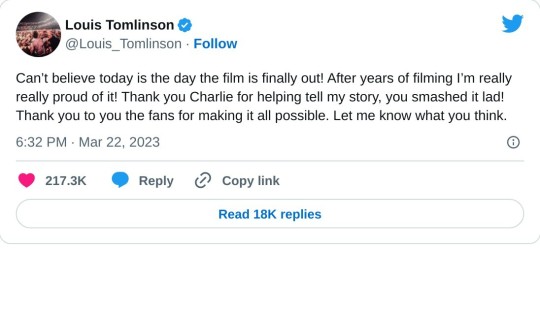
As of this writing, Louis has released two albums and is currently in the midst of his second world tour. What the singer didn’t realize in 2015 was that One Direction’s breakup wouldn’t be the end of his career — it was only the beginning. Where he thought he would be starting from scratch, he instead retained the fervent dedication of millions of fans worldwide.
“That’s all I’ve been waiting for, really — to have these moments,” he shares. “And it does kind of feel like, finally, the stars might be aligning for me.”
Overall, All of Those Voices will give fans a refreshingly honest look at what it’s like to be on the other side of the stage — to have it all, lose it in an instant, and fight the odds to earn it back.
All of Those Voices is currently playing in theaters worldwide.
50 notes
·
View notes